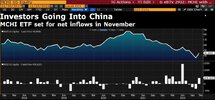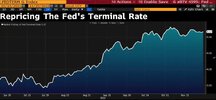over9k
So I didn't tell my wife, but I...
- Joined
- 12 June 2020
- Posts
- 5,524
- Reactions
- 8,091


Wage pressure may still be there.Lower than expected monthly CPI data may cool rate hike bets, but it's too soon to be certain that inflation is slowing, according to AMP Capital senior economist, Diana Mousina.
With trimmed mean underlying CPI up 0.3 per cent on-month versus 0.5 per cent expected, she says forecasts of a year-end inflation peak around 7.75-8 per cent may be too high and expectations for rate hikes in 2023 could come down.
Still there's little chance of the RBA pausing its rate hikes next month as it doesn't meet again until February, wages growth is still rising with the September quarter WPI surprised to the upside, an "ultra-tight" labour market means wages growth should remain "decent" and inflation near 7 per cent is "way too high" versus the 2-3 per cent target.
Moreover, she says it's "too soon to be certain of a slowing in inflation" because the monthly CPI data isn't as comprehensive as the quarterly CPI release.
So, as has happened in the past, the wage pressure is very much a lagging process, and despite easing in CPI, the pent up demand for catch up pay rises will go well beyond this point.Australia faces a “salary stand-off” with employers resisting paying higher wages and employees threatening to walk away as inflation continues to wipe out pay rises.
That’s the message from one of the nation’s leading recruiters, Robert Walters, based on a salary survey that shows four in five white-collar workers will start looking for a new job if they don’t get a pay rise above inflation in the next 12 months.
With 56 per cent of their employers saying they won’t be offering salary increases above inflation, next year will see a gap in expectations around wages, according to the survey of about 1500 employees and companies.
The survey tracks salaries against inflation, and shows that while some jobs have attracted increases of more than 30 per cent, others remain well below CPI.
Big wages rises were recorded for managing directors in sales, marketing and communications (33.3 per cent); chief financial officers in listed companies (28.3 per cent); investment consultants in banking and financial services (19 per cent). The “losers” included HR advisers (6.3 per cent); senior business/finance analysts (5.6 per cent); administration assistants (3.5 per cent); tax/ internal audit managers (3.1 per cent). Some jobs went backwards – in-house legal counsels (-1.4 per cent); and remuneration managers (- 3.7 per cent).
The survey reported that 97 per cent of candidates told researchers the minimum “fair” pay rise during the current cost of living crisis would either need to match or surpass inflation; while 65 per cent of candidates said they expect their employer to consider the rising cost of living when determining salary increases and bonuses over the next 12 months.
or picking losers in the necessary Chinese slowdown ??Is it on purpose as suggested before to flush out tge "bad seeds" or a top rivalry vs Xi?
Chinese game
Very good results. One more rate rise only I think. Australia may escape yet again.OZ cpi came in at 6.9 , less than the consensus opinions. From Evil Murdoch Empire
Wage pressure may still be there.
Apart from the likely union pushes now the the IR bill looks like it will clear the senate, according to a=nother article from Evil Murdoch press
So, as has happened in the past, the wage pressure is very much a lagging process, and despite easing in CPI, the pent up demand for catch up pay rises will go well beyond this point.
Mick
Should I go and buy a property then? ?Very good results. One more rate rise only I think. Australia may escape yet again.
that would depend on how much cash you can put down at settlement , a 5% deposit might be nerve-wracking , whereas ( near )100% cash down could be a compelling deal ( depending on the property returns )Should I go and buy a property then? ?
Good morning divs4everthat would depend on how much cash you can put down at settlement , a 5% deposit might be nerve-wracking , whereas ( near )100% cash down could be a compelling deal ( depending on the property returns )
i was talking on Tuesday to a shopkeeper who bought his home at 18% interest ( in the 1970's ) but it was done working two jobs because the purchase price was realistic .
Hello divs4everwell in my case i bought ( almost ) 5 acres of vacant land for $17,500 ( current estimated value over $700,000 , still no house but a solar array feeding into the grid ) @ 17.5%
NORMALLY , RBA rates need to get above ( real ) inflation , but what happens this time when most government data is inaccurate ( will banks really lend at 7% when real inflation is over 12% ? )
IF property prices start to drop ( which is possible ) what will banks do when mortgages slide into negative equity ( and what will pensioners go if they reverse-mortgaged their homes , just like some politicians suggested )
looks like a train-wreck coming , let's see who has long memories
Hello divs4ever,you don't have to be smart , just live long enough to learn by experience
now i prefer second-hand experience ( learning from others ) because i already have a hide full of scars
sometimes simple is the best way to go (complexity leaves more room for things to go wrong )
hint , banks prefer to take more than their fair share ( at every good opportunity )
cheers
Australia appears to have escaped the worst of the global inflation surge, although some risks remain that prices will push higher again.
The latest Bureau of Statistics monthly Consumer Price Index Indicator – showing annual inflation fell from 7.3 per cent in September to 6.9 per cent in October – ranks Australia among the world’s lower-inflation economies of the past year.
The October reading was below market forecasts and is good news for home loan borrowers as it suggests future Reserve Bank interest rate rises may be limited.
Figures from The Economist Intelligence Unit and Haver Analytics show that among 42 countries, only 14 have lower inflation than Australia, and the majority of these are in Asia.
Lockdown-hit China’s annual inflation is just 2.1 per cent, Japan is 3.8 per cent and South Korea 5.7 per cent.
In contrast, Britain’s inflation is 11.1 per cent, the Euro area is 10.6 per cent and the US is 7.7 per cent, while at the extreme end Turkey is 85.5 per cent and Argentina 88 per cent.
https://www.theaustralian.com.au/bu...s/news-story/d1e3e3b42a9ca174b1b9dc852ee8577e
Lower-than-expected monthly CPI data give some hope of smaller interest rate hikes, but economists say not to read too much into early signs of a peak in inflation. A 6.9 per cent rise in the recently constructed monthly CPI was well below a consensus forecast of 7.4 per cent, but a long way above the Reserve Bank’s 2-3 per cent target range.
Still, traders saw less chance of a full 25 basis point lift in the cash rate at the next RBA meeting.
The S&P/ASX 200 share index jumped to a six-month high of 7284.2 points and the 10-year Commonwealth government bond yield fell 7 basis points to 3.535 per cent.
The money market implied the Reserve Bank might consider a 15 basis point hike to 3 per cent next Tuesday.
The market-implied cash rate peak fell to 3.75 per cent versus 3.84 per cent for November 2023.
NAB said the monthly CPI series and shouldn’t be read as a sign that inflation has peaked.
“It is also worth emphasising data for October only reflects up-to-date price information for 62 per cent of the basket,” said NAB economist Taylor Nugent. “The key for the RBA remains the outlook for wages growth and the extent to which wage and price setting behaviour has shifted.”
Goldman Sachs Australia chief economist Andrew Boak said the monthly CPI data “should be interpreted with caution” as they don’t capture prices changes in all items of the CPI basket.
“In particular, around 38 per cent of items is imputed to be zero on-month in the first month of each quarter given they are not surveyed until the second month of the quarter – including many administered and market-services items,” he noted.
II have in the past suggested that one can take a tad more than a grain of salt when it comes to economic forecasts.Assuming these items record positive price changes, inflation will automatically tend to re-accelerate in the second month of the quarter.
ANZ economists said the monthly CPI data would not be enough for a “Santa pause” in rates.
RBA deputy governor Michele Bullock has said that it will take time to “figure out what is the noise and what is the information” in the series.
A soft monthly CPI at the start of the June quarter “wasn’t a particularly useful predictor for the quarter as a whole”, ANZ economists said.
We use cookies and similar technologies for the following purposes:
Do you accept cookies and these technologies?
We use cookies and similar technologies for the following purposes:
Do you accept cookies and these technologies?
